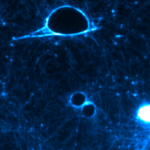Lien vers Pubmed [PMID] – 27189984
Genome Biol Evol 2016 06;8(6):1643-60
In France, human botulism is mainly food-borne intoxication, whereas infant botulism is rare. A total of 99 group I and II Clostridium botulinum strains including 59 type A (12 historical isolates [1947-1961], 43 from France [1986-2013], 3 from other countries, and 1 collection strain), 31 type B (3 historical, 23 recent isolates, 4 from other countries, and 1 collection strain), and 9 type E (5 historical, 3 isolates, and 1 collection strain) were investigated by botulinum locus gene sequencing and multilocus sequence typing analysis. Historical C. botulinum A strains mainly belonged to subtype A1 and sequence type (ST) 1, whereas recent strains exhibited a wide genetic diversity: subtype A1 in orfX or ha locus, A1(B), A1(F), A2, A2b2, A5(B2′) A5(B3′), as well as the recently identified A7 and A8 subtypes, and were distributed into 25 STs. Clostridium botulinum A1(B) was the most frequent subtype from food-borne botulism and food. Group I C. botulinum type B in France were mainly subtype B2 (14 out of 20 historical and recent strains) and were divided into 19 STs. Food-borne botulism resulting from ham consumption during the recent period was due to group II C. botulinum B4. Type E botulism is rare in France, 5 historical and 1 recent strains were subtype E3. A subtype E12 was recently identified from an unusual ham contamination. Clostridium botulinum strains from human botulism in France showed a wide genetic diversity and seems to result not from a single evolutionary lineage but from multiple and independent genetic rearrangements.


